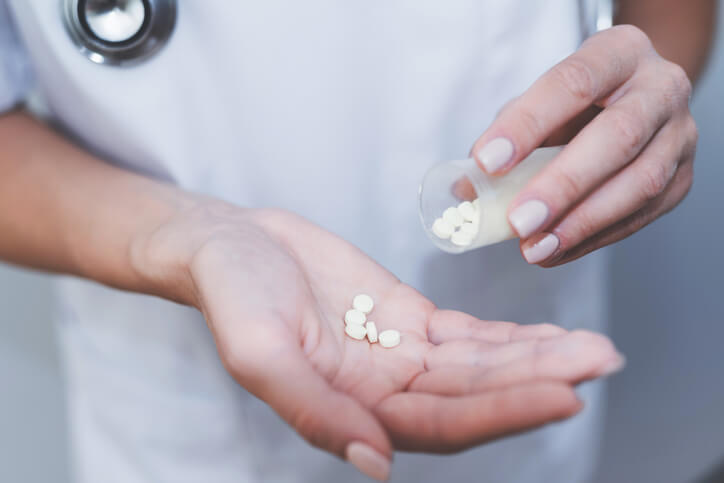We almost never get the chance to share good news about cancer. But thanks to several recent studies, it seems that melatonin may be a new, more effective weapon for fighting breast cancer progression.
Melatonin — the natural hormone your body’s pineal gland produces — may be a secret weapon for slowing down breast cancer progression. As a universally known sleep aid and “jet lag drug,” scientists can now make synthetic melatonin in any laboratory. You can walk into any drug or grocery store and buy melatonin gummies, pills or liquid drops. However, recent studies show that the hormone’s benefits may extend much farther than we ever realized. According to recent study data, melatonin actually slows breast cancer progression and even eases chemo pain.
Study Shows Melatonin Can Prevent Chemo-Induced Neuropathy Pain
Researchers at the Universities of Edinburgh and Aberdeen wanted to find a way to alleviate chemotherapy-induced neuropathic pain (CINP). About 70% of chemo patients develop this condition, which causes tingling and pain sensations to occur. Patients report feeling tingling or pain whenever they’re touched or exposed to colder temperatures. Some breast cancer patients experience such severe CINP that they choose to limit or halt chemotherapy treatments completely.
The November 2017 study found when patients take melatonin prior to chemotherapy, it can limit nerve cell damage and pain. And since overactive nerve cells cause CINP as well as painful symptoms, taking melatonin beforehand eases both. However, in breast cancer patients who already developed CINP, melatonin supplementation didn’t have the same effect. Scientists believe that based on these results, oncologists should administer melatonin prior to starting treatment to help prevent neuropathy pain.
Study Shows Melatonin Stops Breast Cancer Progression With Low-Dose Chemotherapy
Of course, pain relief is just one benefit melatonin offers breast cancer patients. A second study looks at the effect melatonin has when combined with popular breast cancer drug Taxotere (generic name: docetaxel). Taxotere is the most popular breast cancer treatment available, despite its link to permanent alopecia. Researchers found melatonin modulates changes that Taxotere makes to the patient’s gene expression profiles, which leads to chemo-induced neuropathy. If you know anyone with permanent nerve pain or fingers and feet that tingle or burn so badly they cannot walk, that’s neuropathy.
Essentially, it makes low-dose Taxotere much more potent and less likely to cause neuropathic pain. This means patients may need fewer chemo infusions to effectively halt breast cancer progression and kill off cancerous cells. It also mitigates any Taxotere-induced pain symptoms during the infusion process when used as an adjuvant therapy drug.
Melatonin Enhances Radiation Treatments for Triple Negative Breast Cancer Progression
The hormone may also make radiation treatments more effective for stopping triple negative (ER-/PR-/HER2-) breast cancer progression. This December 2017 study found taking melatonin prior to radiation treatments made them more effective for halting breast cancer progression. How does this work? According to researchers, melatonin helps by “inhibiting proliferation, inducing cell cycle arrest, and down-regulating proteins involved in DNA repair.” Melatonin’s beneficial effects on both chemotherapy and radiation doesn’t stop there, though. Even chemotherapy-resistant patients may benefit from melatonin supplements, according to research published just this month.
Melatonin May Also Halt Breast Cancer Progression In Chemo Drug-Resistant Patients
Yet another study published in January 2018 found that the hormone even stops breast cancer progression in chemo drug-resistant cases. Researchers believe it shows promise as an adjuvant drug treatment. Melatonin may also assist in preventing women who work night-shift jobs from developing breast cancer, since it regulates circadian rhythm. Why does this matter? Long-term exposure to artificial light at night is one major breast cancer risk factor for women working disruptive shifts. Scientists connected the dots between taking melatonin for sleep and its role in slowing or halting breast cancer progression. New research on using melatonin as an anti-cancer preventative could prove promising, especially for women in high-risk groups.
How to Check Your Eligibility for Compensation Online
If you or someone you love suffered Taxotere permanent hair loss after chemotherapy, you may qualify for a cash settlement. That’s because the drug’s manufacturer, Sanofi-Aventis, listed the possibility of permanent hair loss on drug packaging and patient education packets globally outside the United States. However, the company specifically failed to include this warning for U.S. cancer patients. As a result, permanently bald cancer survivors are now suing the drug’s manufacturer for failure to warn. Plaintiffs say they weren’t given a choice between Taxotere, which studies show causes up to 15% of patients to go permanently bald, and Taxol, which is equally effective without the risk for permanent alopecia. Without knowing about all possible side effects and alternative treatments, it is impossible for patients to truly give informed consent.
To instantly see whether you may qualify for compensation, fill out your free claim review today. Once you’ve submitted your information, an experienced advocate will call to arrange a confidential onsite consultation to discuss your case. If you do qualify for a cash settlement, you’ll review how to best get the justice and compensation you deserve in person.
Related: Hair Loss Timeline for Taxotere Chemotherapy Cancer Patients
Mandy Voisin
Mandy Voisin is a freelance writer, blogger, and author of Girls of the Ocean and Star of Deliverance. As an accomplished content marketing consultant, mom of four and doctor's wife, Mandy has written hundreds of articles about dangerous drugs and medical devices, medical issues that impact disabled Americans, veterans' healthcare and workers' compensation issues since 2016.

